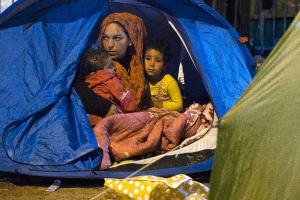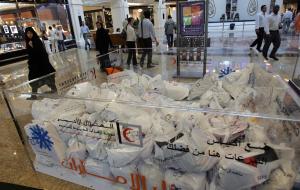United Nations (United States) (AFP) - A UN study of new sources of financing for its multi-billion-dollar aid operations is recommending a voluntary tax on football matches or concerts as one option to raise funds.
The report released Sunday in Dubai also recommended tapping into Islamic social finance and mandatory alms-giving (zakat) as well as improving the transparency of relief operations to cut costs.
More wars and natural disasters over the past decade have sent the price tag for global UN aid efforts skyrocketing, from $2 billion in 2000 to $ 24.5 billion in 2015, according to the nine experts who drafted the report.
At the same time, the United Nations is struggling to meet its funding appeals. Last year, a funding shortfall forced UN agencies to cut food rations to 1.6 million Syrians living in refugee camps, a move now seen as having partly triggered the mass exodus of refugees to Europe.
"The world has never been so generous... and yet never has our generosity been so insufficient," said European Commissioner Kristalina Georgieva, who chaired the panel along with Sultan Nazrin Shah of Malaysia.
Helping victims of catastrophe and war is "morally right and also in our own self-interest as the migrant crisis has shown," she told reporters ahead of the release.
UN Secretary-General Ban Ki-moon was to present the report by the high-level panel on humanitarian financing during a visit to Dubai on Sunday.
The UN panel is proposing a three-pronged approach, starting with a fresh focus on reducing demand for humanitarian aid by beefing up conflict-prevention.
Also, the circle of donors must be broadened to find new donors -- only five countries provide two-thirds of all public humanitarian aid.
- Micro-levy for aid -
One of the most concrete proposals from the panel is a new "solidarity levy" that countries would agree to apply to certain goods or services.
The new tax is modelled after Unitaid, a non-governmental organization that persuaded 10 countries to impose a small tax on airline tickets to generate funds to combat malaria and AIDS.
A tax on airline travel or fuel could help fund medical services in refugee camps or in areas hosting displaced civilians, said the report.
Georgieva said "a micro-levy on a massive volume is possible" on an array of transactions such as fuel, concerts, movies or sporting events.
The Bulgarian economist and EU budget commissioner said there had been exchanges with the scandal-tainted FIFA football federation on a possible contribution.
"My sense is that it is not impossible," Georgieva told reporters ahead of the release of the report.
Another option would be to tap into the billions generated annually in the Muslim world from alms-giving.
Those donations amount to between $232 billion and $560 billion annually, according to estimates quoted by the report.
Just one percent of "zakat" would made an enormous difference in global funding, it added.
The report will be a key topic of debate at the World Humanitarian Summit in Istanbul in May.
Georgieva headed EU humanitarian operations before becoming budget commissioner and her name is often floated as a potential successor to Ban, who steps down at the end of this year.
http://news.yahoo.com/un-eyes-tax-football-tickets-pay-humanitarian-aid-103738307.html;_ylt=AwrC0COjr5tWQVAAjOnQtDMD;_ylu=X3oDMTByNXQ0NThjBGNvbG8DYmYxBHBvcwM1BHZ0aWQDBHNlYwNzcg--
Dangerous strain of dog flu spreads concern across U.S.
A dangerous new strain of dog flu is spreading concern across the West. A dog in Montana recently tested positive for the highly contagious virus, and the Washington state health department is warning pet owners after possible exposure at a Seattle-area kennel.
In Chicago, the dog flu spread so quickly last year that some shelters were forced to close their doors to prevent further contamination, reports CBS News correspondent Adriana Diaz.
At Paws Chicago, they've treated around 300 sick dogs at their hospital and helped find them temporary homes while they recover. Vets understand the difficulty of containing this highly contagious virus.
Ashley Leise walks dogs in the Seattle area. She's paying extra close attention to her four-legged friends after warnings about the new strain of dog flu.
"They can get sick just like us, and I know how much I hate being sick," Leise said.
King County public health officials say up to 90 dogs staying at a kennel outside of Seattle may have been exposed to the virus. Two have tested positive for flu, but further tests are needed to confirm it's the new strain.
"None of the dogs have immunity to fight it off, so you see large numbers of dogs getting ill when the virus starts to circulate," said Beth Lipton, vet for Public Health Seattle and King County. "When dogs are going to day care or dog parks or boarding overnight in kennel facilities, it can spread very rapidly."
Cases first showed up last March in Chicago and spread quickly. Around 2,000 dogs in 24 states have been infected. A vaccine was made available in November.
Vets say the disease is rarely fatal, but owners should see a vet right away if their dog shows symptoms.
"So if your dog doesn't eat well, misses a meal, if you see coughing, if you see lethargy, just being tired, moping around, it could be a sign of a fever," vet Rob McMonigle said. "If you see that, give your local vet a call and schedule an appointment because they'll need to get on some special medications for it."
The Seattle and King County health department says their Facebook post outlining the symptoms has been viewed 189,000 times since Tuesday. Local vets are now stocking up on the vaccine.
And while the virus is no laughing matter, a viral video features a Chicago pup named Herbert who's putting on a brave face while recovering from the flu.
"Dogs are household members and often times they're like kids in the family," Lipton said. "People want to take care of their pets and do the right thing and keep them safe."
Humans can't contract the virus, but they could spread it to healthy dogs after close contact with an infected dog.
http://www.cbsnews.com/news/dog-flu-spread-concern-in-west-washington-state-seattle/


No comments:
Post a Comment